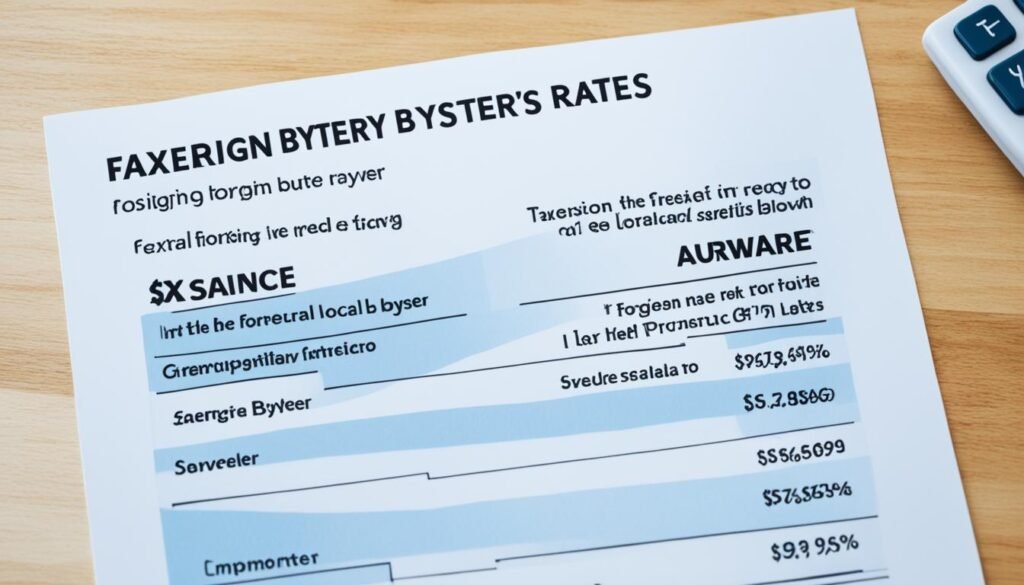Australia’s alluring landscapes and steadfast economy are magnets for overseas investors real estate Australia, raising the question: can foreigners buy property in Australia? Navigating foreign ownership laws Australia, non-citizens find varying entry points into the real estate market. Understanding property investment for non-citizens Australia is vital, as buying property as a non-resident in Australia comes with specific mandates and financial commitments, from FIRB regulations to distinct property residency rules for foreign buyers Australia. With the right approach, purchasing real estate in Australia as a foreigner opens the door to diverse investment opportunities.
Key Takeaways
- The Foreign Investment Review Board (FIRB) plays a critical role in overseeing foreign investments in real estate.
- Foreign investors often provide higher home loan deposits compared to local buyers1.
- Joint property purchases may bypass the need for FIRB approval under specific conditions1.
- New dwellings and land for construction are the primary property types available to non-citizens1.
- Additional costs for foreign buyers include higher interest rates on mortgages and various state-dependent taxes1.
Introduction to Property Ownership in Australia for Foreign Buyers
The legal framework for foreign property investments in Australia is defined by key legislative measures that dictate the acquisition process, management, and oversight by relevant authorities. For instance, Section 12A of the Act specifies that the acquisition of Australian urban land by foreign entities is subject to certain regulations2. This is an essential starting point for anyone exploring property ownership in Australia for foreign buyers, as it establishes the fundamental legal boundaries within which non-residents must operate.
Why Australia’s Real Estate Market Appeals to Overseas Investors
The attraction of Australia’s real estate market for overseas investors is multifaceted. Factors such as a stable political environment, strong legal system, and a persistent demand due to land scarcity contribute to its appeal. Moreover, the potential for strong commercial returns and policy incentives like negative gearing often make it an attractive investment opportunity. With over 93% of all foreign investment proposals, primarily in real estate, receiving approval in the 2012-13 period, the market’s open stance towards foreign investors is evident2. Such statistics underscore the welcoming nature of the Australian market, making it a prime destination for real estate investment for those abroad.
Unpacking the Legal Framework Governing Foreign Property Investments
Understanding the nuances of the legal framework for foreign property investments in Australia is crucial for any potential investor. The Treasury oversees all foreign investments through a comprehensive prior approval process2. For example, the acquisition of new dwellings by foreign investors is usually approved without stringent conditions, providing a straightforward pathway for those looking to invest in new properties2. Similarly, applications to purchase vacant land are commonly approved under the condition that construction begins within 24 months2, fostering development and ensuring that investments contribute to the Australian housing supply. The legislation also allows for the imposition of conditions on approved investment proposals, as outlined in Section 252, to align foreign investments with national interests.
Further highlighting the scope of regulation, temporary residents in Australia may purchase one established dwelling, but they are required to sell the property within three months if they leave the country2. This ensures a dynamic real estate market that accommodates foreign investors while promoting circulation and availability of property. In parallel, property developers may seek an advanced off-the-plan certificate for sizable developments, facilitating the marketing and sale of new projects to overseas buyers2. Notably, recent reforms have tailored the regulatory framework, reflecting evolving economic circumstances and the market’s needs2.
The attraction of the Australian real estate market for foreign buyers, buttressed by an adaptive legal framework, makes it an unparalleled investment landscape. The continual refinement of policies and oversight mechanisms speaks to the country’s commitment to both welcoming foreign investment and safeguarding its own economic interests.
Eligibility Criteria for Non-Citizen Property Purchases

Delving into the eligibility criteria for non-citizen property purchases in Australia reveals a complex interplay of regulations, where the Foreign Investment Review Board (FIRB) plays a pivotal role. The FIRB operates as a gatekeeper, ensuring that overseas investments align with the nation’s interests. It is crucial for prospective buyers to comprehend the role of the FIRB in managing foreign investments in real estate and the fundamental necessity of acquiring FIRB approval before proceeding with any property purchase.
Understanding the Role of the Foreign Investment Review Board (FIRB)
As a high-level regulatory body, the FIRB reviews proposals by non-resident foreign persons with the intent to partake in the Australian housing market. The FIRB’s assessment includes a variety of factors, such as the applicant’s residency status and whether they constitute a foreign person entity, like corporations and trusts that meet specific criteria. Notably, as of July 1, 2017, approval is necessary before foreign non-residents may purchase residential property within Australia3. Successful applications permit potential buyers to invest in an unlimited number of new dwellings or to acquire vacant land for residential development, provided they adhere to conditions including completing development within four years3.
The Importance of FIRB Approval for Overseas Investors
Obtaining FIRB approval signals to overseas investors the viability of their intended property acquisition in Australia. However, foreign non-residents face restrictions on purchasing established dwellings, ineligible for homes, holiday properties, or rental purposes, with the exception being if they operate a significant Australian business housing Australian-based employees3. Nevertheless, they may procure established dwellings for redevelopment, which must genuinely augment the housing stock and meet specific criteria3. A residential land exemption certificate further simplifies the process for eligible foreign persons, allowing the purchase of unspecified properties, excluding established dwellings, without necessitating individual approval for each acquisition3. FIRB approval is thus a crucial step that confirms the eligibility and aligns foreign investors with the stringent regulatory environment established by Australian foreign investment laws
Types of Real Estate Available to Foreign Investors in Australia

When considering investing in Australian real estate, foreign investors often inquire about the types of real estate available to foreign investors in Australia. Statutory guidelines dictate that non-residents and foreign investors are primarily eligible to purchase new dwellings and vacant land intended for construction14. This policy supports the growth of the housing supply and ensures that foreign investments contribute positively to the development of new infrastructure.
Understanding the financial investment required, it should be noted that the application fees for FIRB approval correlate with property value, with costs spanning from $5,000 for less expensive properties to a substantial $503,000 for high-value properties exceeding $40 million14. FIRB’s oversight ensures that foreign investments align with national interest parameters. Furthermore, in the 2019-20 financial year, a robust AU$14.8 billion was attributed to residential property purchases by expats5, demonstrating a strong foreign interest in the Australian real estate market.
An important consideration is that foreign investors often face more stringent financial requirements when acquiring property. They may need to provide a higher deposit for home loans—typically around 30%—and can encounter higher interest rates on mortgages than local buyers1. Moreover, owning a property in Australia requires adherence to tax obligations; foreign investors must declare any rental income and may be subject to capital gains tax upon selling their property14.
In certain situations, investors can bypass the FIRB approval if purchasing jointly with an Australian citizen, a permanent visa holder, or a New Zealand citizen1. This exemption underlines the Australian government’s encouragement of property co-ownership, fostering a collaborative investment landscape.
Moreover, for those with the applicable visa status, such as certain temporary residents, the option exists to buy one established dwelling as a residence, or new property/vacant land for investment purposes4. Yet, it’s crucial to recognize that foreign investors are otherwise restricted from purchasing established dwellings to preserve the supply for Australian homebuyers4.
There are also fiscal obligations and additional costs to be considered. Capital Gains Tax is applicable, with a significant withholding tax on properties valued over $2 million4. In South Australia specifically, a Foreign Owner Surcharge since 2018 further increases the cost of property ownership for foreign nationals and temporary residents4. Stamp duty, legal fees, insurance, and inspection fees add layers to the overall costs of property acquisition, where conveyancers and solicitors play a pivotal role, typically charging around $7004.
The attraction of Australian property for foreign investors cannot be understated, with median property prices witnessing a surge of 70% over the last decade5. Nonetheless, the complexities of purchasing real estate—rooted in legal requirements and financial commitments—underscore the importance of comprehensive prior research and expert counsel. By mitigating potential pitfalls and utilizing strategic investment avenues, foreign investors can effectively navigate the Australian real estate market.
Can foreigners buy property in Australia

The question of whether can foreigners buy property in Australia has a multifaceted answer that oscillates around regulations established by the government to maintain a balanced real estate market. Particularly, the Australian government aims to ensure that foreign investments contribute positively to the country’s housing stock.
Navigating the FIRB Approval Process for New Dwellings and Land
For foreigners looking to own a slice of Australian land, navigating the FIRB approval process stands as a crucial step. Since May 9, 2017, the Australian government has introduced a 50% cap on foreign ownership in new housing developments, a measure that applies to New Dwelling Exemption Certificates approvals received after this date6. This strategic move aims to moderate overseas investment while supporting local buyers’ access to housing.
Those planning to buy new properties or land for development must get familiar with this tailored approval process. The FIRB, which serves as a gatekeeper for foreign property purchases, ensures that such investments are in line with national interests. For efficient compliance, foreign persons should seek guidance on the intricate details of the application process, which can be found in depth through thelimits on buying established residential properties.
Limits on Buying Established Residential Properties
Limits on purchasing established residential properties echo the government’s intent to control the market dynamics influenced by foreign investments. While new developments have attracted a cap, it’s imperative we highlight that the aforementioned 50% foreign ownership cap does not apply to existing approvals or applications lodged before May 9, 20176. Purchasing existing residential properties is typically not an option unless the property is set for redevelopment.
This cautious stance is supplemented by an additional measure: foreign owners are bound by law to pay an annual vacancy fee, ensuring their properties are not left uninhabited or unused. The details enshrining the vacancy fee demand the property to be either occupied or available for rent for at least six months in a 12-month period. Residential status encompasses dwellings inhabited by the owner or relatives, those leased, or even made available on the rental market, with leases no shorter than 30 days6. Should a foreign owner fail to comply, they are expected to submit an annual vacancy fee return to the Australian Taxation Office, with the fee typically matching the residential land application charge paid upon FIRB approval for property acquisition6.
| Requirement | Details |
|---|---|
| New Development Ownership Cap | Not more than 50% of ownership allowed for foreigners post-May 9, 20176 |
| Vacancy Fee | Mandatory if property is not occupied or rented out for at least six months in a year6 |
| Status Documentation | Annual return submission to the Australian Taxation Office6 |
| Fee Exemptions | Properties under substantial repair or legal ownership change6 |
Woven into this regulatory fabric are exemptions from the vacancy fee, accommodating properties under significant renovations or experiencing a change in ownership during the vacancy year6. These exceptions aim to promote investment in property improvements and transactions while guarding the market against speculative vacancy.
To conclude, can foreigners buy property in Australia is a question answerable with a cautious ‘yes’, as long as one abides by the FIRB’s outlined requirements and conditions. With a firm grasp of the permissible extents and limits, foreign investors can judiciously embark on property ventures on Australian soil.
The Financial Implications: Costs and Taxes for Foreign Buyers

Understanding the financial implications for foreign buyers is pivotal when considering property investment down under. The costs and taxes associated with such a substantial financial venture can significantly influence a foreign buyer’s choices and strategy. One of the primary considerations is the Foreign Investment Review Board (FIRB) application fee, which stands at a daunting $28,200 for a specific unit for a foreign-based investor, compounded by an additional stamp duty surcharge that could reach $122,0007. This financial burden highlights the importance of strategizing finances, awaiting potential permanent residency, and perhaps searching for more favorable market conditions.
When viewing the costs and taxes for foreign buyers in Australia through a regional lens, variances in state policies become apparent. For instance, New South Wales’ substantial 8% stamp duty surcharge will see a reduction to 4%8, signaling a potential easing of the financial load for foreign investors in the near future. However, this contrasts with Queensland and Victoria, where stamp duty surcharges are 7% and 8% respectively, with Victoria expecting a rise in the absentee land tax surcharge to 4%8. These additional charges can decisively impact an investor’s financial calculus, emphasizing the need for thorough due diligence and budgeting.
Moreover, the strategic shifts in investment trends reveal a nuanced picture. While the overall value of applications for residential property purchases by non-residents decreased to $1.5 billion from a higher $2.4 billion7, the dynamic nature of foreign investments sees more investment flows from countries such as India, with applications rising to 148, and a slight increase from Nepal7. These fluctuations underscore a marketplace that continuously evolves with global economic and political landscapes, shaping the financial implications for foreign buyers.
The costs and taxes for foreign buyers in Australia are not solely confined to upfront charges. Long-term financial commitments such as the anticipated tripling of the foreign investment fee9 and the annual vacancy fee, which could amount to $169,200 for an existing property worth $1.1 million9, factor into the total cost of ownership. However, with New South Wales offering tax refunds to eligible foreign buyers9, there is a glimmer of fiscal reprieve, albeit varying by state.
It is evident that any prospective investment in Australian property necessitates a nuanced understanding of the diverse financial implications for foreign buyers. Whether it’s FIRB fees, stamp duty surcharges, or long-term taxes, the economic landscape for foreign investors continues to be dynamic and layered with complexity. Navigating these financial waters will be crucial for those looking to invest, and success will depend heavily on diligent research and planning.
Overcoming Common Challenges When Buying Property in Australia

Finding the right Australian property as a non-resident involves navigating a series of unique challenges that range from interpreting financial requirements to complying with local real estate regulations. The steep increase in the price to income ratio index, pointing to a 78% rise between 1980 and 2015, showcases the uphill battle for affordability in the Australian market10. Additionally, the cost of homeownership has burgeoned, with nominal median house prices in major cities like Sydney, Melbourne, and Brisbane skyrocketing over the past few decades10.
Finding the Right Australian Property as a Non-Resident
Non-residents aiming to penetrate the Australian real estate market must contend with these rising costs, seeking out properties that align with their investment goals. With around 6% of the housing stock changing ownership each year, opportunities are abundant, but finding a suitable property requires nuanced understanding of local markets11. Prospective buyers should engage with credible realtors and leverage comprehensive market analyses to uncover properties that promise long-term returns.
Translating Foreign Income into Eligibility for Australian Mortgages
Moreover, translating foreign income for Australian mortgages presents another hurdle. Private renters in Australia, who face an average of 20% of their gross household income spent on housing costs, can find themselves in a precarious financial position compared to those with a mortgage—16%—illustrating the importance of securing favorable loan conditions10. This involves presenting exhaustive documentation and evidence of income stability, which is imperative for lenders when assessing a non-resident buyer’s loan eligibility. Mortgage applicants should prepare to prove their financial health through translated income statements, tax returns, and employment verification to meet stringent Australian lending criteria.
In conclusion, while the journey to owning property in Australia as a non-resident involves various complexities, the process is navigable with diligent preparation, expert advice, and a strategic approach to financial planning. By overcoming the common challenges in buying property in Australia, foreign investors stand to gain from the robust real estate market and secure a lucrative foothold down under.
Mortgage Considerations for Non-Resident Property Investors

When delving into the Australian property market, mortgage considerations for non-resident property investors can be complex but surmountable with the right guidance. Ensuring compliance with tax obligations is paramount, necessitating the acquisition of an Australian tax file number (TFN) and regular reporting of rental or sale income from the propertyforeign residents doing business in Australia12.
Investors must be cognizant of the requirement to lodge an annual vacancy fee return if they own residential dwellings, as this reports on the property’s residential use12. Critical consideration must also be given to capital gains tax obligations when profiting from the sale of taxable Australian properties, including apartments and commercial spaces, as these bear significant financial impact on investment returns12.
A comprehensive approach is necessary for non-resident property investors, as failure to comply with local laws can prompt compliance actions. This includes data matching techniques used with financial institutions to ensure complete tax reporting from foreign residents12. Additionally, off-the-plan purchases introduce a capital gains tax requirement if contractual rights are disposed of prior to the completion of construction12.
| Tax Consideration | Requirement | Impact on Non-Residents |
|---|---|---|
| TFN | Apply for tax file number | Necessary for tax reporting |
| Vacancy Fee Return | Annual Lodgment | Reports property’s residential use |
| Capital Gains Tax | Pay on profits | Applies to selling property |
| Compliance Actions | Data matching with financial institutions | Ensure income and taxes are reported |
| Off-the-Plan Purchases | Trigger capital gains tax if sold before completion | Affects contractual rights and tax liabilities |
For property developers, obligations expand into the realm of goods and services tax (GST) on new residential premises for sale; however, they can claim GST credits for related purchases. It is important to note that sales of existing residential premises typically dodge the GST obligation, sparing non-resident investors from an additional layer of taxation in those cases12. Commercial premises dealings often intersect with GST, allowing claim back on GST credits for purchases—pointers that are relevant when considering mortgage capacities and associated costs12.
- Lodge Vacancy Fee Return – Annual reporting for residential property use.
- Capital Gains Tax – Payable on the sale of taxable property.
- Compliance Actions – Ensure correct tax reporting with institution data matching.
Adept navigation of the Australian property landscape demands that non-resident investors seek a full understanding of mortgage considerations and the multifaceted tax environment. With judicious financial planning, acknowledgment of the particulars discussed here, and support from experienced mortgage brokers or financial advisors, non-residents can secure their investment with confidence.
Exemptions and Special Cases in Australian Foreign Ownership Laws
Understanding the nuances of Australian foreign ownership laws is crucial for international investors considering engaging in the real estate market down under. These laws, established under The Foreign Acquisitions and Takeovers Act 1975 (FATA) and the accompanying Regulations, shape the landscape of property investment, specifically channeling funds into the construction of new dwellings to stimulate economic growth13. With the threshold for significant actions in residential land acquisitions set at $013, the implications are significant, impacting a range of investments from individuals and corporations.
Joint Property Purchases with Australian Residents
In the realm of joint property purchases with Australian residents, the complexities of the law present both hurdles and exemptions. Australian residents looking to purchase property alongside foreign partners can, under certain conditions, mitigate the requirement for Foreign Investment Review Board (FIRB) approval13. Such collaborations may simplify the approval process, with exemption certificates granting pre-approval for lower-risk investments, ensuring a more streamlined and less cumbersome acquisition of property13.
Circumstances Relieving Foreigners from FIRB Approval Requirements
There are several noteworthy circumstances relieving foreigners from FIRB approval requirements. For example, the acquisition of new dwellings by foreign persons mandates FIRB approval; however, specific occupancy criteria for near-new dwellings can influence this requirement13. Furthermore, the Treasurer has the authority to issue a no objection notification (NON) if an investment is not contrary to the national interest, an action that can streamline the path to property ownership for foreign investors under certain conditions13.
Regarding vacant residential land – areas not currently featuring a permanent building for occupation – approvals are compulsory for foreign purchasers, a measure enforced to ensure the property contributes to the housing stock and economic prosperity13. However, investments that do meet the Government’s policy objectives, like directing foreign investment towards the creation of new dwellings over established ones, might be seen favorably in terms of their potential developmental impact and contribution to government revenues through taxes such as stamp duties13.
The Treasurer’s stance on foreign investments can involve a variety of actions, ranging from disposal orders to imposing specific conditions, which are leveraged to safeguard national interests and dictate the extent to which foreigners can influence the Australian residential land market13. It’s worth noting that these decisions are bound by strict timeframes, though extensions are possible under special circumstances, further illustrating the flexible nature of these regulations when justified by particular scenarios13.
It’s evident that navigating the legalities of real estate acquisition in Australia as a foreign investor involves recognizing both the stringent controls in place and the exemptions that facilitate particular investment opportunities. Partnership with Australian residents and adherence to the overarching goal of enhancing the housing market through new development are paths to successfully engaging in Australia’s property sector.
The Path to Ownership: Step-by-Step Guide for Foreign Buyers
Navigating the complexities of property investment in a foreign country can be a daunting task. This step-by-step guide for foreign buyers serves as a roadmap to help illuminate the path to ownership for those seeking to invest in the promising Australian real estate market.
- Research the Market: Prioritize familiarizing yourself with the current trends and areas of growth within Australia’s property landscape. This is crucial for making an informed decision.
- Legal Considerations: Understand the legal restrictions in place. Approximately twenty-four states in the U.S. have enacted laws that restrict foreign investments in agricultural land, highlighting the importance of due diligence in legal matters14.
- FIRB Approval: Seek the Foreign Investment Review Board’s (FIRB) approval, which is a critical step for foreign investors in Australia. Without this, the purchase cannot legally proceed.
- Financing: Approach Australian banks or international lenders that offer mortgage options to non-residents, ensuring that you comply with all financial prerequisites.
- Property Inspection: Before finalizing any deal, conduct a thorough property inspection to avoid any unforeseen issues.
- Professional Guidance: Consult with real estate agents, attorneys, and financial advisors familiar with the Australian market and foreign investment regulations to navigate the buying process effectively.
- Closing the Deal: Once all previous steps have been successfully completed, proceed to close the deal. Prepare for potential taxes or fees that might apply to your situation.
Embarking on the path to ownership in Australia as a foreign investor necessitates adherence to pertinent legal frameworks. In the U.S., states like Arkansas have taken legislative measures, such as SB 312, to target and regulate foreign investments in real estate – a trend that’s equally critical to monitor within Australia14.
Understanding these regulations
is vital for a smooth transaction and to avoid penalties for non-compliance. Recent legislative efforts aimed at restricting foreign investments in real property and agricultural land have emerged in various U.S. states, signaling a global rise in scrutiny that could mirror challenges faced by buyers in Australia14.
Implementing a step-by-step approach ensures that all legal, financial, and regulatory aspects of the property purchase are addressed. The complexities of foreign investment require a methodical navigation through each necessary checkpoint to secure property ownership without setbacks.
“Diligence is the mother of good fortune.”
Adhering to this step-by-step guide and remaining informed of pertinent legislative developments will significantly augment a foreign buyer’s prospects for a successful investment in Australian real estate.
Recent Trends and the Future of Foreign Real Estate Investment in Australia
The landscape of foreign real estate investment in Australia continues to evolve, shaped by a mix of economic, regulatory, and global influences. With its strategic position in the Asia-Pacific region and a reputation for transparency, Australia provides a lucrative avenue for investors seeking to expand their portfolio15.
How Worldwide Events Influence Australian Property Markets
International occurrences have significant reverberations in the local real estate domain. Notably, the interconnectivity of worldwide events and Australian property markets is conspicuous, as each major global incident—from financial crises to political upheaval—sends ripples that affect property values and investment attractiveness15. Australia’s economic resilience, displayed by the fact that the annual current-account deficit underscores its dependency on foreign investment15, often makes it a safe haven for international capital during times of turmoil.
Comparative Analysis: Australia vs. Other Countries for Property Investment
When juxtaposing property investment in Australia with other locales, one must consider a myriad of factors. A comparative analysis of property investment in Australia reveals a compelling narrative of stability and growth. Australia’s strong legal protections, afforded by agreements like the Australia-United States Free Trade Agreement, establish confidence with heightened thresholds for investment screening in diverse sectors15.
Australia’s international standing in business operation efficiency, as indicated by the World Bank’s Doing Business Report which ranked Australia 18th out of 190 countries, coupled with a high GNI per capita of USD 51,36015, further solidifies its position as an attractive destination for property investors. Moreover, the ease of setting up a business, with only 2.5 days required to register a new venture15, streamlines the process for investors looking to integrate their real estate ventures into the broader business ecosystem.
| Indicator | Australia | Global Average |
|---|---|---|
| Real Estate as a FDI Recipient | Second largest in U.S. FDI | Varies per country |
| Ease of Doing Business | 18th out of 190 | — |
| GNI per Capita | USD 51,360 | — |
| Starting a Business Duration | 2.5 days | — |
In summary, the recent trends in foreign real estate investment in Australia point towards a market that values stability, transparency, and efficiency. These aspects, combined with the country’s strong economic indicators and favorable business conditions, make it a primary target for international property investors seeking dynamic and secure opportunities15.
Conclusion
Wrapping up the article, it’s evident that the real estate landscape in Australia offers promising opportunities for foreign investment. With the median rent for a house in capital cities standing at $757 per week and for a unit at $579 per week16, the market is both active and appealing. The influx of foreign investment is palpable as proposals surged from 4327 between 2020 and 2021 to 5433 between 2021 and 2022, demonstrating a growing international confidence in Australia’s property sector16. So far this year, 3196 applications have been greenlit for residential purposes, further cementing the crucial role foreign investors play in shaping the economy16.
However, ensuring the availability of leasing options remains difficult. April’s figure of 36,785 properties available to lease in Australia reflects this challenge16. Still, foreign investors are showing their commitment to the market, having invested $17.6 billion since 2020 to secure Australian properties16. Most investments originate from countries like China, Hong Kong, Vietnam, the United Kingdom, and Singapore, linking Australia to significant global economies16. Interestingly, despite more vacant homes existing than foreign investors buying properties for residential purposes, the demand for rental properties remains unsolved, as highlighted in the ongoing analysis of the housing market crisis.
The article’s insights underline the importance of understanding and adhering to Australia’s legal and regulatory framework when considering property investments. Being aware of the vital statistics, such as investment inflows and the FIRB’s current stance on foreign investment, can lead to informed decisions—a strategy underscored by the yet unachieved pre-pandemic interest levels from abroad16. Foreign investors are encouraged to comprehensively research and seek professional advice to navigate the complexities of the Australian real estate market effectively.
FAQ
Can foreigners buy property in Australia?
Yes, foreigners have the opportunity to buy property in Australia, but there are regulations and requirements they must adhere to.
Can overseas investors buy real estate in Australia?
Yes, overseas investors can buy real estate in Australia, subject to certain conditions and approval from the Foreign Investment Review Board (FIRB).
What are the eligibility criteria for non-citizen property purchases in Australia?
Non-citizens need to obtain FIRB approval before acquiring an interest in property. Failure to do so may result in penalties.
What types of real estate are available to foreign investors in Australia?
Foreign investors can generally purchase new dwellings and vacant land for development. In some cases, they may acquire existing dwellings for redevelopment.
What is the process of buying property in Australia as a foreigner?
Foreign buyers need to navigate the FIRB approval process for new dwellings and land. There are limits on buying established residential properties, with certain requirements for redevelopment.
What are the financial implications for foreign buyers purchasing property in Australia?
Foreign buyers need to consider costs and taxes, including the application fee for FIRB approval and the annual vacancy charge for non-resident owners. Non-resident home loan approval and interest rate implications should also be taken into account.
What are some common challenges faced by foreign buyers when purchasing property in Australia?
Foreign buyers may face challenges in finding the right property, conducting research, and navigating the process of translating foreign income for Australian mortgages.
What are the mortgage considerations for non-resident property investors in Australia?
Non-resident property investors may need to provide a larger deposit and potentially face higher interest rates when obtaining a home loan in Australia. There are Australian lenders that specialize in dealing with foreign borrowers.
Are there any exemptions or special cases in Australian foreign ownership laws?
Joint property purchases with Australian residents may be exempt from FIRB approval requirements. There are also certain circumstances that may relieve foreigners from the need for FIRB approval.
What is the step-by-step guide for foreign buyers on the path to property ownership in Australia?
Foreign buyers need to obtain FIRB approval, apply for non-resident home loan approval, and navigate the property purchase process. Seeking professional advice and conducting thorough due diligence is essential.
What are the recent trends in foreign real estate investment in Australia?
Recent trends indicate that global economic factors and political changes influence Australian property markets. Comparatively, property investment in Australia presents unique opportunities and challenges.
Source Links
- https://www.expertsforexpats.com/country/australia/finances-and-money/how-to-buy-property-in-australia-as-a-foreigner/
- https://www.aph.gov.au/-/media/02_Parliamentary_Business/24_Committees/243_Reps_Committees/Economics/44p/Real_Estate/Report/Chapter2.pdf?la=en&hash=D5F62C78C447794415520AEBB3FDE6B56BCD2585
- https://foreigninvestment.gov.au/sites/firb.gov.au/files/guidance-notes/03_GN_FIRB.pdf
- https://adelaidesouth.com.au/foreign-buyers/
- https://blog.currencyfair.com/consumer/a-guide-for-foreigners-buying-property-in-australia
- https://treasury.gov.au/sites/default/files/2019-03/Stronger-rules-for-foreign-investors-owning-Australian-housing.pdf
- https://www.afr.com/property/residential/extra-tax-sends-foreign-home-buying-south-20240209-p5f3qf
- https://www.exfin.com/stamp-duty-land-tax
- https://www.afr.com/property/residential/property-taxes-on-foreign-buyers-may-be-illegal-20240117-p5exzy
- https://www.aph.gov.au/about_parliament/parliamentary_departments/parliamentary_library/pubs/briefingbook45p/housingaffordability
- https://www.rba.gov.au/publications/bulletin/2010/jun/1.html
- https://www.ato.gov.au/businesses-and-organisations/international-tax-for-business/foreign-residents-doing-business-in-australia/owning-real-property-in-australia
- https://www.aph.gov.au/About_Parliament/Parliamentary_departments/Parliamentary_Library/pubs/rp/rp2223/Quick_Guides/ForeignAcquisitionofResidentialLand
- https://nationalaglawcenter.org/foreign-investments-in-ag/
- https://www.state.gov/reports/2019-investment-climate-statements/australia/
- https://www.news.com.au/finance/money/investing/who-will-pick-up-the-slack-foreign-investors-hold-the-key-to-solving-rental-crisis/news-story/55d37ce21bbfd71f0a75971a400b5cb4
Comments